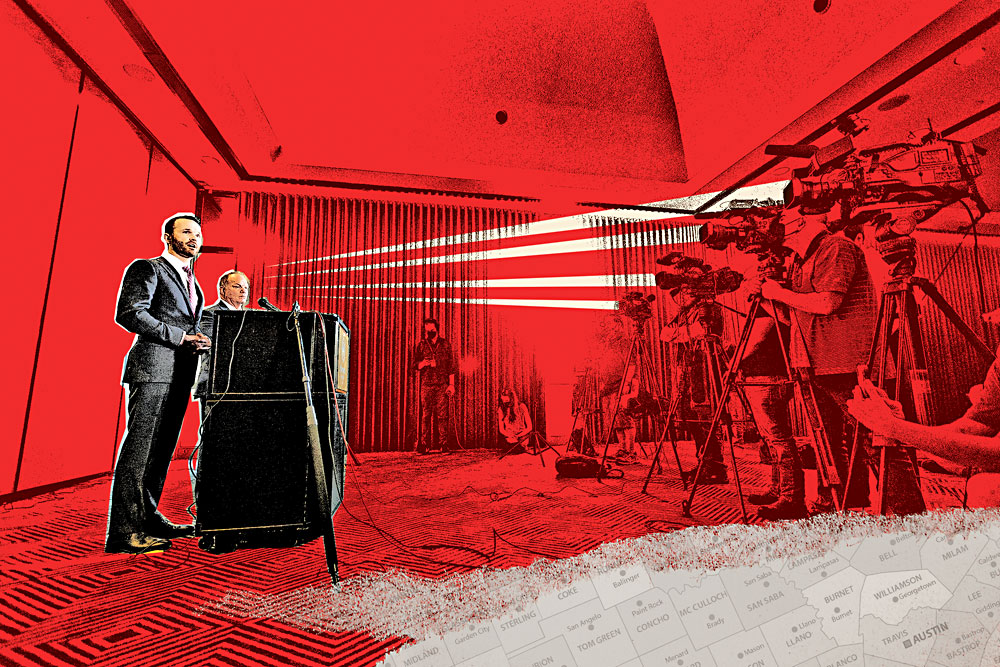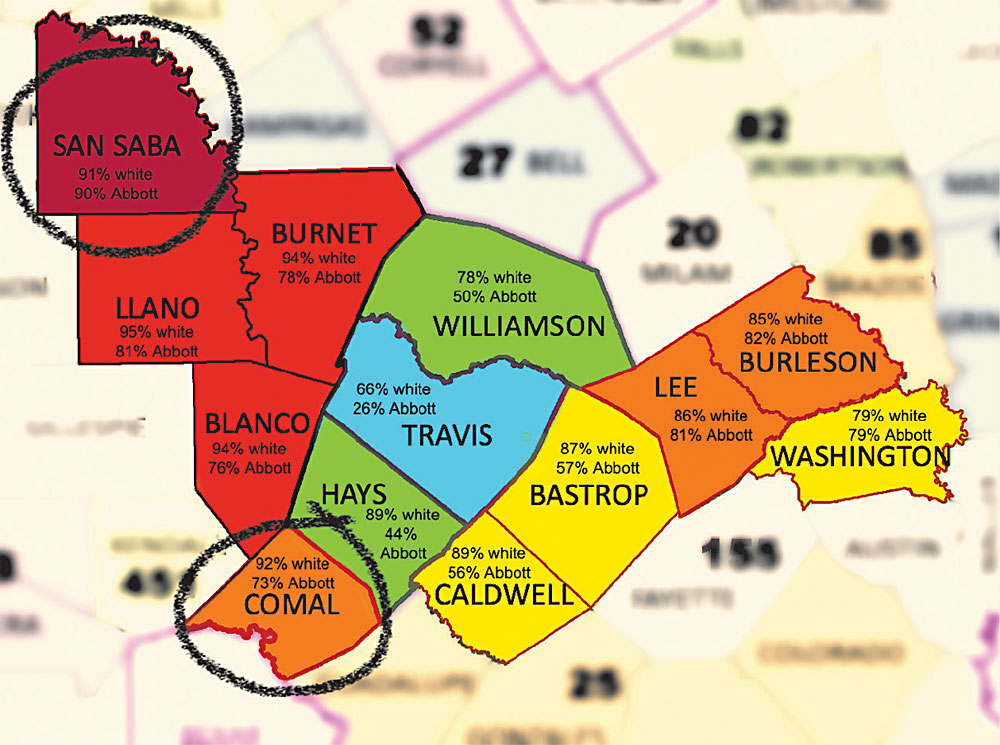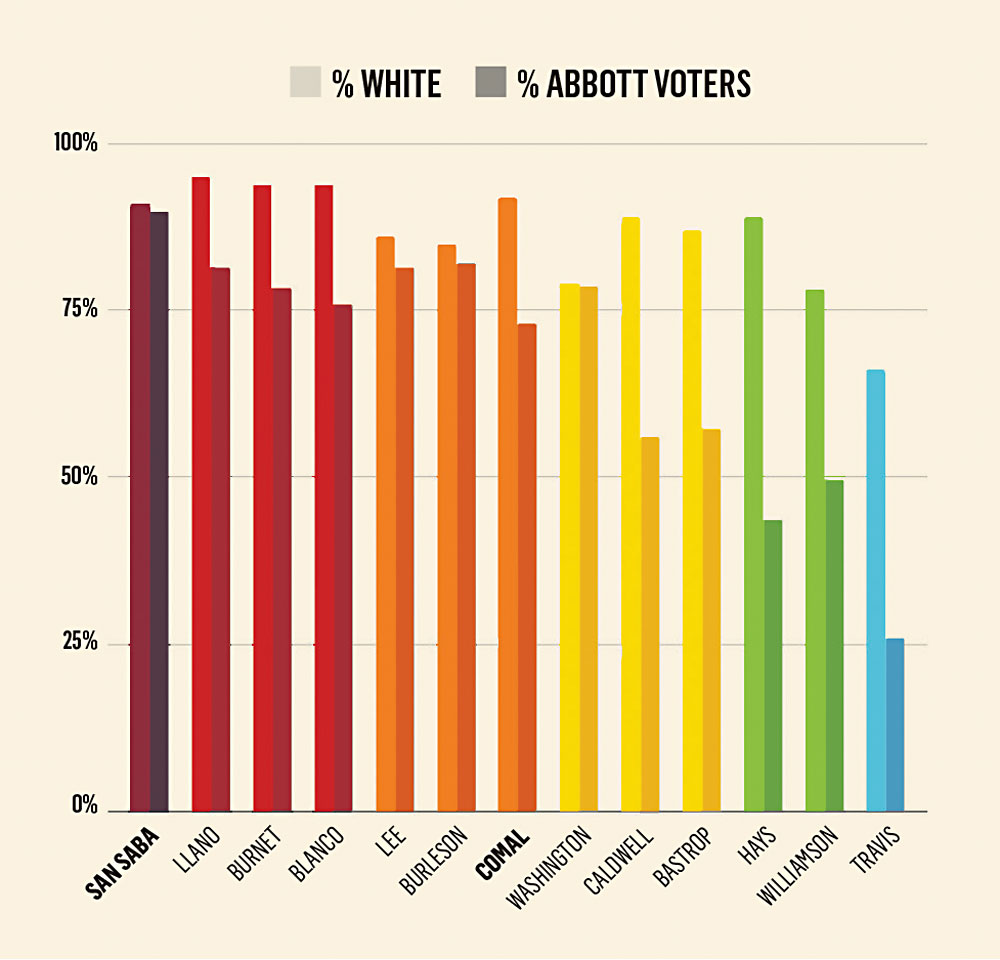Why Do Christopher Taylor's Attorneys Want His Trial in Trump Country?
Take a look at the counties they chose from
By Maggie Q. Thompson, Fri., Aug. 4, 2023

Austin Police Department Officer Christopher Taylor's attorneys signaled weeks ago that they'd ask for his murder trial to be moved out of progressive Travis County. Taylor's fatal shooting of the unarmed Mike Ramos – a Black and Latino man – was certainly high-profile in Austin, where Ramos' name appeared on posters beside George Floyd's in 2020 protests for police reform.
The change of venue motion Taylor's defense attorneys filed July 25 doesn't explicitly address Travis County's politics, but it argues that unfavorable body-cam footage and news stories about Ramos' death have rendered any county within "the Austin media market" too prejudiced against Taylor for him to receive fair trial. Defense attorneys Doug O'Connell and Ken Ervin don't define that market or its boundaries, but ask that Judge Dayna Blazey move the trial to Comal or San Saba County – both more than 91% white, and won by Gov. Greg Abbott over Beto O'Rourke in 2022 by 3-1 and 9-1 margins, respectively.
Because the motion emphasizes that emotional tweets about Christopher Taylor are evidence of a too-biased community, Blazey granting it would set a precedent that any trial of a police officer who has been criticized via tweet or protest may be swept away to a county much whiter and much more Republican than Travis.
The motion's reliance on tweets also brings into question how Taylor's team identified San Saba and Comal counties as the only counties where Taylor could receive a fair trial – they say that of the 12 counties in judicial districts adjacent to Travis County's, 10 are within Austin's "media market." (Ervin tweeted in response to my question about how Taylor's team defined the Austin media market, "I understand that you have limited knowledge of legal procedure but I shouldn't have to explain geographical media markets to you.") In any case, the attorneys consider Comal, less than 50 miles away, outside the influence of Austin's media market and social media presence, while Washington County, more than 90 miles from Austin, is considered inside that same market and therefore an unfair venue for a trial. (Washington County is also only 79% white, rather than 91%, but we don't know if that's a factor.)
Despite the haziness around their specific choice of counties, O'Connell and Ervin have support from seven prominent members of Austin's legal community, who wrote affidavits in support of moving the trial. The Statesman described the affiants as "some of the city's most seasoned attorneys," each having "decades of criminal court experience in Austin on some of the city's highest-profile cases."
That's true. But a closer look reveals some important connections. The affiants include: Judge Blazey's ex-husband, an attorney whose firm represents Alex Jones, and an attorney who represents Nate Paul.


We Present Exhibit A, Your Ex-Husband
"Exhibit A," the first sworn affidavit in the motion, is written by Charles F. Baird, a former judge on Texas' highest criminal court who, like Blazey, is a Democrat. He is also her ex-husband, to whom she was married from 1982 to 1992.
Former District Attorney Margaret Moore also provided an affidavit. She is Blazey's former boss. Blazey worked as an assistant D.A. in Travis County for 30 years, and for the final three years under the leadership of then-D.A. Moore.
Another affidavit comes from Sam Bassett, whose higher-up David Minton represented Alex Jones during his high-profile divorce proceedings and after his 2020 DWI arrest. A 2017 Statesman photo shows Jones with his arm wrapped around Minton, pretending to kiss him. That same month, a Statesman reporter quoted Minton describing Jones on InfoWars as a mix of "humor, bombasity, sarcasm, wit." (For reference, Jones started spreading the conspiracy theory that "no one died" during the Sandy Hook Elementary School shooting in 2014.)
The next to provide an affidavit is Wayne Meissner, whose clients include Republican Texas Supreme Court Chief Justice Nathan Hecht, who's been in hot water several times for shady campaign finance practices and other judicial ethics violations (some of which led to his retaining Meissner).
Next up on the list of affidavits is Gerry Morris, who currently represents Nate Paul, the real estate mogul that Attorney General Ken Paxton is accused of accepting bribes from. Paxton's impeachment trial next month will examine those alleged bribes.
Next to support the change of venue motion is Joe James Sawyer, an excellent defense attorney whose accomplishments include "not guilty" verdicts in several cases that sound a lot like murder. His website describes them like this: "Client shot an unarmed man two times in the chest killing him in front of three eyewitnesses who testified at trial. The shooting occurred in a parking lot at an apartment complex. VERDICT: NOT GUILTY."
Finally, there is an affidavit from Joe Turner. In 2000, back when Doug O'Connell was a prosecutor, Turner and O'Connell faced off in the murder trial of Paul Anders Saustrup, who had followed Eric Demart Smith, a Black teenager, for two blocks before shooting him twice in the back. Turner argued that Saustrup acted in self-defense because he believed Smith had broken into his girlfriend's car minutes earlier. The Statesman quoted O'Connell during closing arguments: "This case is certainly not about self-defense. The defendant shot a drunk kid in the back two times." Turner, on the other hand, argued to the jury that it's easy to tell the good guys from the bad guys. "Here's the good guy," he said, pointing to Saustrup. "And here," he said, displaying a photo of Smith's tattoos, "is the bad guy. He's dead because he's the bad guy." Saustrup was found not guilty.
The District Attorney's Office has 30 days to respond to the change of venue motion. If they do, it will trigger a hearing on the matter.
Got something to say on the subject? Send a letter to the editor.








